#I gave a few nuggets of advice but I don't want this going around
Text


It’s A-Okay, Anon! Thanks for the clarification on the tone that you were using when writing this, I get that it’s super easy for intent to be lost in translation! :)
It’s okay for you to write self-indulgent works and post it everywhere! Write/draw/create things that make you happy!
The depressing thing about Canon x OC is that you kind of have to rein in on your expectations cause it’s hard to care about something you don’t have an investment in as an outsider. Those that GET really popular OCs kind of stick with it for a very long time and create something for people to be invested in, like that Ana x OC fic on AO3 that has a pretty nice number of viewers for the niche.
Escentially, you’re making a niche (canon x oc) of a niche (canon x reader insert) by slapping a name and actual face/distinguishable features on what is supposed to be a generic reader insert. Any writer who has written enough works and has observed statistical trends (both fandom/IRL publishing after removing trademarked properties) can tell you that it’s significantly harder to get results with that BUT there is always a chance of striking lightning too (as a ‘pioneer’, in hindsight).
I think I made an earlier mistake of using my own works as ‘proof’ that success is possible for Canon x OC when, in reality, I’m drawing in views on the ‘parent’ of that niche instead (Canon x reader self insert) which is a completely different beast entirely.
I’m sorry if I encouraged anyone with that earlier mistake of mine.
You guys DO have a much harder time gaining traction and I hope my insight offered something like a bit of guidance or at least a springboard for you guys to do more research into your niche (cause that is actually what it is).
#please do not reblog#I gave a few nuggets of advice but I don't want this going around#cause i dont feel comfortable of the possibility of this post leaving my control#also DO take a look at the filtering features on AO3 to observe trends#it's really quite interesting#btw you can leave a comment or send me an anon if you want#we can have discussion without reblogging
4 notes
·
View notes
Text
Chasing Baker
My Nana was my greatest adversary.

In an otherwise charmed life, Nana was an immovable force and the only legitimate challenger to my willpower. Not without the warmth one would expect from a grandmother, Nana could be sharp - like a sun-warmed pane of glass. Lesser hearts might have bent to me when I requested accommodation - but not Nana. Nana set a firm bedtime, insisted on efficient tooth brushing, and rather than negotiate with hair tangles, made short work of them in single, swift wrenches when brushing your hair. No nonsense. When you stayed with her - in one of two twin beds in a room made precisely for grandchildren - you often found yourself in bed with the lights out, with no real memory of having gotten there, swept away in the tide of your sheets. Nana was uncompromising, and no arena was more suited to our mutual stubbornness as the dinner table.
I grew up a notoriously picky eater. After a weekend at my Uncle Jerry's, my mom received a hardcover copy of "The Strong-Willed Child" from him as a gift. He had spanked me for not eating chicken nuggets. As evident by its title, the book was meant to coach my mother on parenting strategies for mitigating my innate obstinance. This would not be the only copy of the book my mother received. Though, I think she could have written one by the time I turned 4. I simply refused to eat the things I didn't like, and that was a long list.
A relative once applauded - clapped his hands together in joy- upon learning that I had graduated from having the crusts cut off my bread to full-blown sandwich eating. The peanut butter and honey sandwich was my signature dish and an absolute staple. I'd like to say I've grown out of it - and I've certainly grown having tried llama steak in Peru, lamb heart at the table of a Lebanese family, and Greenland shark in an Icelandic cafe - but it took me a long time to let go of my habits and permit myself to try, and it took some coaxing. My preferences ran deep.
My diet from ages six through eleven included Eggo waffles, peanut butter and honey sandwiches, an assortment of cereals, a handful of specific fruits and vegetables, and the occasional steak when mom thought my iron was low. My mom - on the advice of a pediatrician who told her that if she force-fed me, I'd develop an eating disorder - catered to this preference. Nana did not. They must have been seeing different pediatricians.
Nana took the clear your plate approach - The approach driven by reward and consequence. Finish your plate, cookies delivered. Fail to try, become hungry and hungrier still as dessert passes you by. I took to swallowing food whole, and my mom took to sending me with granola bars on visitations. She'd line the interior of my suitcase like we were smuggling drugs. I'll admit it was an unusual form of contraband, but the measure seemed necessary in a divorced child's duplicitous world. What my mom saw as nourishment, my Dad might see as undermined parenting strategy even under the best of circumstances - which they often weren't. I was hungry, so decided it best to keep things a secret and wrappers out of the trash.
Despite Nana's apparent best efforts, I avoided the eating disorder. Thanks to my mom, I avoided most foods until my early 20s. I don't know who was right. What I know for certain is that I was loved.
When I sat down with Nana after my trip to Mt. Baker, she clutched her heart as she said. "Ally - to think about you as this little girl - and that you would only eat peanut butter and honey sandwiches - to think of you climbing mountains…" she shakes her head, "… well I just can't believe it."
I started to laugh and asked her, "Want to know the best part?"
She nodded, smile in her eyes, full of that sunny warmth - playful and kaleidoscopic.
"I ate peanut butter and honey sandwiches up and down the side of that mountain, Nana," I told her, laughing, and then we laughed together. Growing up is fun, I thought, especially in moments like this.
Laughing with your grandmother is a gift you receive in exchange for time, and it is a beautiful gift indeed. Here is a woman who bathed you, clothed you, fed you - and by the time you're old enough to understand the magnitude of the life she held before all that, she is often gone. I'm lucky to have this time. Nana is 90 years old now, and my mother's mother passed at 74. I never got to have the conversations I wanted to have with my grandmother, who died. To ask her questions like, 'Who were you?' 'What lifetimes made up the love you gave so effortlessly away?'
There is something about mountain climbing that makes you consider those kinds of questions in real-time. There is something about mountain climbing that makes you feel as if you are in the process of 'becoming.' So when, at the parking lot of Grandy Creek Grocery, I met my fellow climbers and our guides - there was a feeling of anticipation and nervousness about who I'd be sharing that story with. Dropping me off, my mom described it like the first day of kindergarten. The first person I met was Sharon.
I had been worried about Sharon. Weeks before, on the pre-trip Zoom call, she stood out from the digital crowd as the most visibly senior person there. Sharon did not look old - she looked undoubtedly the oldest. I think this is an important distinction - particularly to Sharon. I remember thinking - "I hope she is not on my trip because I'm worried she will show me down." A very judgmental thought and the universe saw to its reckoning. Sharon surprised the hell out of me.
She paced the parking lot, and I jumped out of my rig to greet her. We quickly began commiserating. Baker would be her first mountain. I had Mount St. Helens under my belt, but it's not much in the way of experience. We talked about our training plan, recounting long drives to taller places. Sharon was from Wisconsin, and she had to drive 45 minutes to get to peaks at 3,000 - the same as me in Eastern Washington. We had a lot in common. Where I ran, she had been hiking with weight and jogging. Sharon wasn't afraid of hard work. On our drive to the trailhead, I learned that she had just lost 75 pounds last year. I learned later that when Sharon signed up for this climb, she hadn't told anyone in her family she was doing it. She was 62 years old and had never once traveled alone. What on earth possessed her to climb a mountain? I'd be afraid of that question, too.
Sharon eventually fessed up to her family and made the trip official. That's how we found ourselves on the side of a mountain together. I'm embarrassed to have been so fundamentally wrong - but my confession is not without meaning, and I learned an important lesson. Never underestimate a Sharon.
When Melissa, our guide, described Mt. Baker for the first time, she called it by its indigenous name, Komo Kulshan. She then gave us its epithet - "The Great White Watcher." Having now met Kulshan face to face, I can tell you that's precisely how he feels. The summit looms as you navigate through the trees. Stoic in the face of the wilderness that surrounds him. Ice cold, he waits. In the Lummi language, he's called 'white sentinel.' He is persistent, vigilant, and watching.
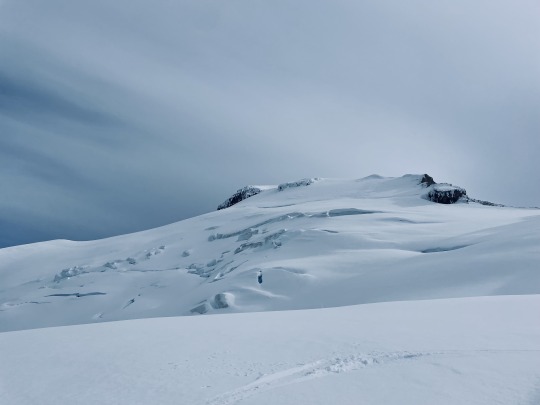
I focused my nervous energy on preparing to meet this mountain by learning what I could about him. I learned that Mt. Baker is 10,781 feet tall, an active volcano, and the second most glaciated mountain in the continental united states (Rainier's got it beat, and you don't count Alaska). It's a formidable mountain, known - as nearly all alpine environments are - for its quickly changing conditions and the perils of its geology. This all, somehow, frightened me less than the thought of meeting Melissa Arnot-Reid. Her legend loomed not in the Cascades - where only a single peak resides above the threshold of 14,000 feet by which the Rockies measure their formidable "fourteeners." Melissa's legend loomed as large as Everest, on who's summit she has been six times - the only American woman to summit without the use of supplemental oxygen and survive. 29,032 feet. Melissa was someone I wanted to learn from, and I was scared shitless of her by reputation.
Suffering a bit of social awkwardness around celebrities, I prepared to meet Melissa by seeking to learn nothing about her at all. The antithesis of my mountain strategy - I told myself our experience would be what it was when we met on the mountain. My job was to learn - to ask my questions courageously - and be vulnerable and bold in seeking truth. I spent a fair bit of time wondering if she might be an ass hole, too. The age-old adage, "don't meet your heroes," drifted in and out of my mind.
In the last 15 minutes of our drive to Grandy's, my mom started reading Melissa's Wikipedia page aloud to me as I navigated the road, undoing months of my concerted preparation. I let her continue, greedy for information. "It says she trains by depriving herself of things - that she'll go without food and water."
"Probably a good idea if you're ever going to be stuck on the side of a mountain without it," I told her. I braced myself for a response. In the past few months, my mother had a growing sensitivity around topics that might suggest I could die on the side of a mountain. Admitting, so blatantly, that mountain climbing was a dangerous sport left me vulnerable to excessive mothering accompanied by exclamations of "Don't you dare!" Instead, my mom sort of nodded and continued, "I'm surprised her baby came out healthy."
My brow furrowed. I hated my mother for saying it. I had avoided a lecture from the mother of the mountaineer but failed to account for the mother of the daughter aged-almost-thirty. My uterus is a topic of conversation around my mother's table. Apparently, so was Melissas. Not wanting to discuss either, I let my mother's comment go unchecked as she continued to list accomplishments. "This article says she's focused on business, not emotions. That she is an incredible problem-solver." Now her reports felt more like cheating - it felt like an unfair advantage to meet someone armed with publicly available information about them. When you Google "Allyson Tanzer," you won't find much about my disposition under pressure. I told my mom it was time to focus and turned up the music.
When we parked, and I went to introduce myself to Melissa, three things happened. As I introduced myself, she first quickly let me know that she would not be giving out hugs due to the pandemic. Then, taking my hand in a firm grip, Melissa detailed that she and our other guide, Adrienne, had critical guide business to discuss and would be with us in a moment. She reported being thrilled to be meeting us as she quickly dropped my hand. Within thirty seconds, I was apologizing profusely and backing my way into the grocery. What can I say - first time formally climbing mountains, and I wasn't sure of the protocol. I fiddled with a bag of Cheetohs and continued to hope that she wasn't just an ass hole.
I went to the bathroom for something to do and remembered what my mother said. Task-oriented. I figured Melissa probably didn't hate me, after all. Despite my earlier misgivings, I was grateful to know a bit about her character, regardless of how 'honestly' that information was obtained. Thanks, Mom.
Our climb began. We left Grandy's in a caravan and parked near 3000' at the winter routes trailhead. On the first day, you ascend to 6000' and establish camp. You carry about 40 pounds, walking 1 mile and about 1000 vertical feet per hour, stopping for 15-minute breaks in those intervals. Conditions are warm, which means you're doing something the mountaineers call "post-holing" - ramming deep holes (as if for a fence post) into the ground as you step through snow that's washed out underneath. It's slow-going and rigorous. An hour and a half in, Melissa reports that we're standing in the location where she usually takes the first break. Unseasonably warm weather with a heavy snow accumulation has made for an exciting start.
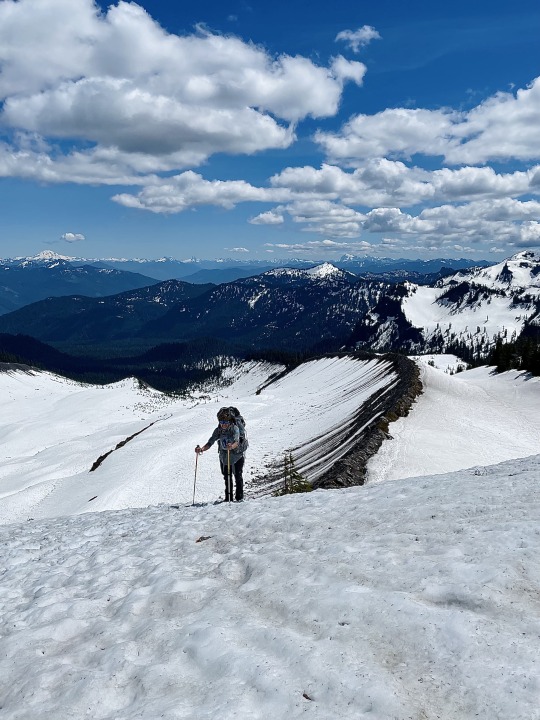
You walk along a canyon ridge formed by a retreating glacier. You realize that time here is not measured in the same cadence that it's known to you. Mountains measure time in millennium, not decades. The formations of rock are carved by years, not minutes. The ground holds a history you can't conceive of - an ancient history of rock and ice. You are constantly struck by feeling small both physically and in your very chronology. I spent the first day happily in awe.
At camp, you maintain - guides (and playfully designated junior guides), boil snow, establish a base, dig a toilet. You assess whether or not you need to poop in a bag and carry it down the mountain with you as you try - for the first time - a rehydrated meal claiming to be chili Mac and cheese. Melissa teaches us how to walk on rope over a glacier. I try to mimic her knots. She redefines your concept of efficiency - breathlessly describing a packing order that accounts for calorie intake, warmth requirements and weight distribution - Every contingency considered. When I win the Ice Ax Rodeo by landing my thrown ax in a particular configuration - all is right in the world. Melissa is a drill sergeant giving instruction. She outlines the next minute - next five minutes - next hour - next day.
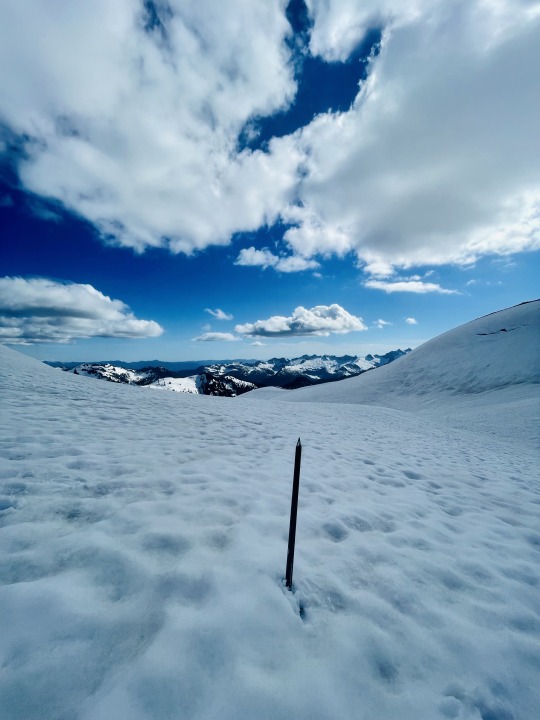
Her matter-of-fact nature reminds me of something. When I gave my parents a ride in an airplane for the first time with me as the pilot in command, I provided them near the same briefing as we were parked on the ramp. It ended dramatically with, "And if anything should happen, you have to exit the aircraft first in the following fashion." At which point I launched myself from the plane. I wanted them to be prepared to fight their instincts to protect me. I’m the only pilot on board - and my job is to protect my passengers, no exceptions. They both described a sense of foreboding and peace at the demonstration. It’s precisely how I felt when Melissa explained how she would be rescuing herself from a crevasse. “If you fall, I get you out. If I fall, I get myself out, but I need your help as an anchor to do so.” She took the approach of coaching us in only what we needed for the next challenge. We would learn crevasse rescue on a need to know basis. At Grandy’s, she told us to expect 48 hours of endurance. At camp, we’re at hour 9. She painted a picture of the following day.
"We'll begin between 11, and 2 am. Expect switchbacks up the glacier, a series of flats, and gains over the next hour. In 3.5 miles, we'll gain an additional 2000 feet - meandering a path through the glacier's crevasses, and it will gradually become steeper over time. About 1.5 miles to the summit, we'll hit the Easton glacier culminating in the Roman Wall. Then, because God has a sense of humor, you have a long flat walk to the summit after the steepest portion. All said it will take us between 5-7 hours to the top."
Frankly, it was just about as simple as that.
My eyes opened at 11:50 pm to the sound of movement outside the tent. Melissa had coached us here, too. "You may not be sleeping," she told us as we readied for 'lights out.' Days from the summer solstice, the sun burned brightly above us at 7 pm. "Remember that you don't need sleep; you need rest. That's what you're getting here at camp. You're horizontal; your feet are out of your boots. Close your eyes, and know you're getting what you need." Felt like a lie, but sure enough, with two hours of sleep, I couldn't describe myself as tired.
I did, however, feel cold. Chilly night temperatures had crept into our tent, and dressing for the day was arduous. I knew to keep my clothes in my sleeping bag. It was a trick I learned from a friend made trekking in the Andes for dressing in the cold. I knew to shorten my trekking poles while climbing, thanks to my guide on that same trek. I'd be leaving my trekking poles behind today, though. Ice axes only. We divide into rope teams. The race begins, but there's no starting pistol - only wind.
Fifteen minutes into our climb and we're struggling to find the rhythm. I'm still shaking the bleariness of the cold. The rope between climbers takes on an interesting dynamic. While it connects you to your fellow climber, it also isolates you from them. You have to maintain a certain distance away from one another while maintaining the same pace. It's a dance with crampons on in glacial ice - a delicate dance indeed - and it's where climbing feels like a team sport. You're all in it together.
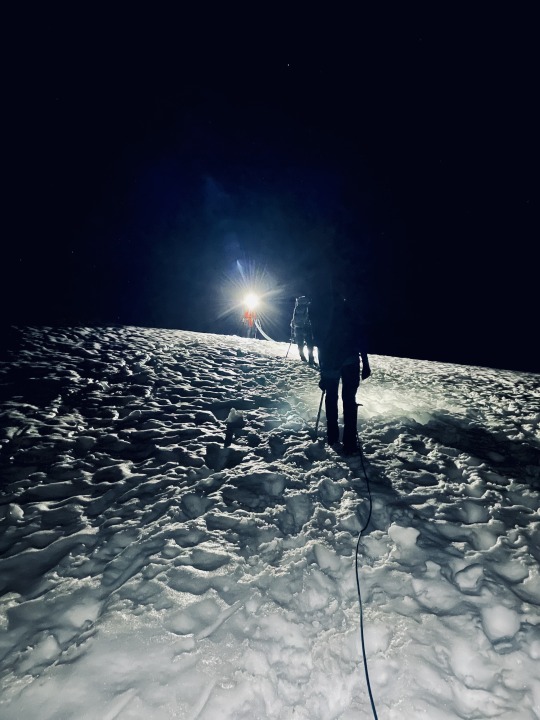
Voices rang out in sequence like a game of telephone - one of our team would need to climb down. We said short goodbyes and waited as Adrienne (guide) descended with climber to camp. We were lucky - we hadn’t been climbing long which meant Adrienne could climb down and back to rejoin her rope. Guide redundancy is a safety net when groups of climbers work together.
Darkness continued. We continued. As you persist, darkness seems to persist along with you. In the first hour, it grows heavy. Your world begins and ends at the light of your headlamp, and that's where you find it—your rhythm. Crampons crunching, breath steady, and the gentle swish of your layers create a sort of timpani, a medley of percussion sounds. Clink, brush, crunch, and clink, brush, crunch, as ax bites ice, the movement of your clothes, and the toe of your boot kicks crampon into snow propelling you forward. There isn't much to think about in this grinding meditation. You're grounded in tugs from ahead or behind you as you march, slowly up. You can count steps, miles, feet of elevation - whatever keeps you moving. Whatever keeps you going up.
Moments before sunrise, we would lose another on our team. I listened to Melissa coach her. "What we're headed to is going to be harder than what we've just done. If how you are feeling is taking away from your ability to focus on your next step - I can only tell you that it's not going to get easier from here." That's when I saw the decision on her face. Another round of goodbyes - this one a bit more somber. She had worked so hard.
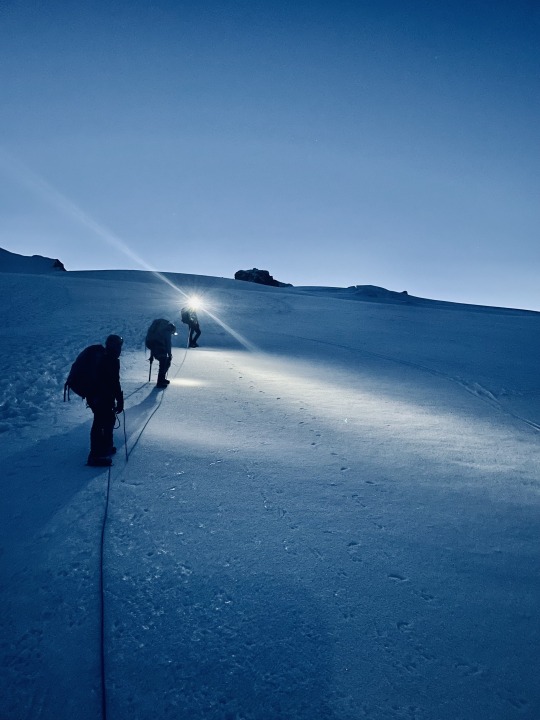
The decision to descend is a difficult one, but it’s one of the most important you can make. There are steep consequences to being in over your head in a place so remote. The summit is a siren, beware. Melissa - aware of the remaining teams intention to summit - advised us to plug our ears as she told the descending climber the Sherpa belief that a mountain won't let you summit for the first time if it likes you. Mountains bring you back. Further, she coached, the decision to go down can lift an entire team's chance of success if you feel you're a liability. Recognizing yourself and your limitations truthfully is a mountain in itself. That's the summit this person made in her decision to descend.
Like a good Agatha Christie novel, our list of characters dwindled. We added layers and continued - five of the original eight. Melissa was right, again. After we lost the second climber, our ascent became a proper climb. From that point forward, if anyone decided to turn around - we would all have to. There was only one remaining guide, and she had to protect all her climbers, no exceptions - me in the cockpit all over again.
She didn't show it, but 62-year-old Sharon was genuinely frightened. She had realized the same thing I did. If she didn't make it - no one would. Sharon kept climbing. Remember when I was worried she would slow me down?
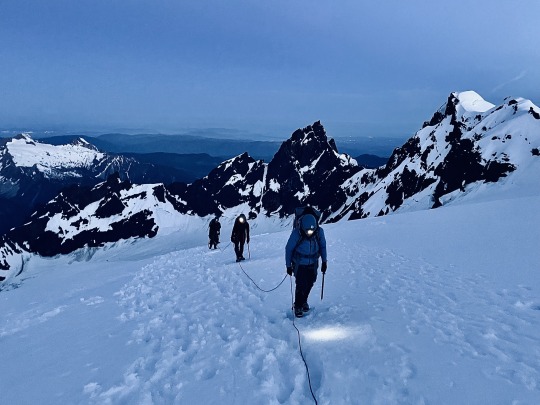
When the sun starts to rise, everything begins to feel possible again. I don't mean to say that things were hopeless, just that with the sun comes energy and a sense of renewal. Color returns to the landscape, and you can begin to be able to measure your progress concretely. The mountain casts a shadow across the earth, stretching miles. You can't believe that you are contained within that shadow, on the face of such a giant who stands so impossibly tall. Melissa stood there, and I took her picture.
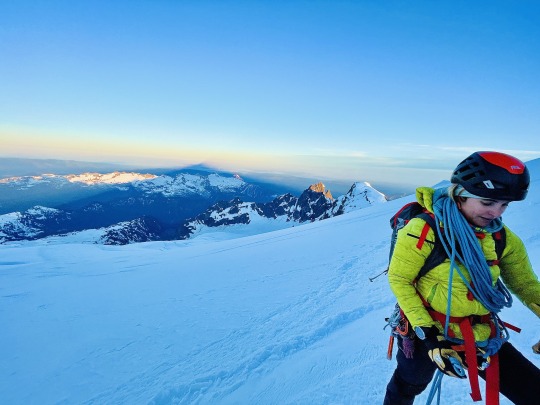
She had turned out to be not an ass hole at all. Where I sought to be her student, she aspired to teach - at once brilliant and kind. Her stride - her sport - a work of art. The precise art of what she calls slow, uphill walking. Her shadow and the shadow of the mountain impressed upon me the power of legends.
As the Roman Wall came into view - I knew we had it. We short rope in and make one last push. If Mt. Baker is a joke from God, the ending of the Roman Wall is its punchline.
Atop the incline awaits a long, easy walk to a haystack peak some few hundred yards in the distance. I was bubbling with emotion as my heart rate settled and the view became clear. There wasn't much difference between where we stood and where we were going. We dropped our packs, unroped, and ran up the summit. I was in tears.
Melissa broke her no-hugs-in-the-pandemic rule and celebrated us each in turn. I snapped countless photos and spent each frozen moment smiling. I pulled Melissa and Sharon in close. I had felt something on my heart and only needed a moment's bravery to share it.
I started awkwardly.
"I'd like to say something to you and Sharon," I muttered, barely audible over the wind, as I tugged on Melissa's sleeve. I grabbed Sharon's arm and pulled her in too. I don't remember the exact thing I said or the exact way in which I said it. I remember pausing to make sure I got it right and wondering for a long time if I managed to do so.
I told them that I had come to the mountain expecting to be impressed by one person. Melissa promised an impressive education - on which she delivered. She is of that rare quality - the kind who’s presence improves you. I came to Baker with that expectation, I confessed, I expected Melissa. I paused before telling Sharon, her gloved hand in mine, “You?” I laughed nervously. “I wasn’t expecting. A 62-year-old woman….” I nodded back to Melissa, “And you, the mother of a 3-year-old…” I didn’t want to get this wrong. “You are two people who our society labels and confines. Yet, here you are - on top of a mountain. I have to tell you….” I was choked up in earnest here and struggled to continue.
"It matters.” I said. “What you do matters. It matters to have an example of what is possible. Both of you have provided that example to me and women like me. Thank you." I sobbed. "I am so grateful for it and grateful for you." Melissa smothered me in her jacket as she embraced me, once again, in a hug. Pandemic be damned. My tears froze. While I expected a "There's no crying in mountaineering" a la Tom Hanks in A League of Their Own (it was a climb of mostly women, after all) the admonishment never came.
Sharon grabbed hold of me next and we shared the alpine view. Before I knew it, we were the last two on the summit. The wind howled a steady cheer. Celebrations concluded, it was time to leave. I stayed for just a moment longer, watching Sharon as she left. They don't make anything more beautiful than a mountain, and it's a view worth savoring. I descended, joyfully, to my team.
I didn't bury Jake up there. In Ashes to Ashes, I told the story of taking my old farm dog's remains to the top of my first volcano. He's not so much a good luck charm as he is an omen of protection. I don't need luck as much as I need safety, and he serves his duty well. Jake stayed with me through our descent to camp. I needed a little protection coming down off the Roman Wall, I thought. I wanted him close until we were off the glacier. He lays now at the foot of my tent—a very good place for a very good dog.
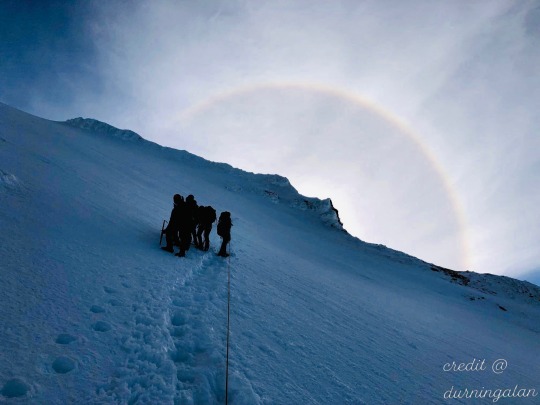
There's a natural mindfulness to climbing. I often find myself living in the present step - not thinking about the route that lies below. You forget in moments that the trip up is accompanied by an equally long and perilous journey down. From the summit, your journey is far from over. Yet, time flies by even as you stop to admire the steam vents. The rainbow that surrounds the sun refracts joy and color the same.
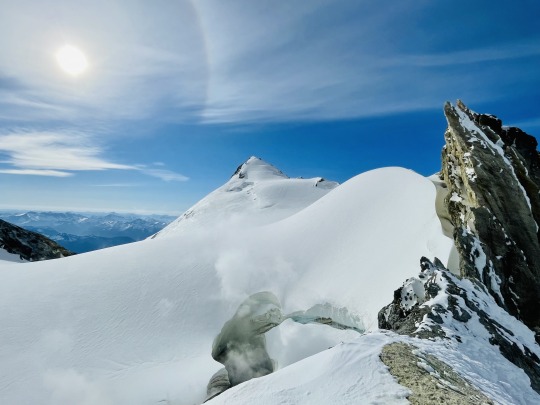
You reach camp, celebrate, pack up. Miles and thousands of feet remain even from there. That's when you realize it's ending and when I realized I didn't want it to end.
We spent the next few miles getting to know each other in earnest, savoring time and mountain views, chatting in the way of long-form hikers - about the nature of things and through storytelling. Melissa regaled us with vulnerable truths and comedic parables. We laughed. I kept sipping at the wells of knowledge around me, drinking in the moments. Laughter distracted from hunger, from wet feet, and from the dull and dim realization that all good things must come to an end. We made our way to the bottom of the mountain. Just like that - we say goodbye.
Sharon drove me back to Grandy's. We chitter like school girls - adrenaline and nostalgia collide in our post-climb delirium. We talk about the future. I realize that we are good friends. I am humbled by just how wrong a person can be to believe something about someone for no good reason.
Mom picks me up, and with her embrace my adventure is over. I’ve come full circle - safe and sound, parked in the lot of Grandy Creek Grocery.
Melissa found us there and knocked on our window.
"Your daughter is really special. The MOST special,” my hero and friend told my mom. Mom beamed with a special pride reserved exclusively for mothers of strong-willed daughters. I had been misreading things - the adventure had only just begun.
There are eight years between Melissa and I. I’m not sure I’ll be chasing Everest in that time, but I know I won’t be finished. I’ve got thirty-three years to catch Sharon at 62. In the mountain blink of sixty-one years, I’ll be as old as my Nana and I hope at least half as wise. Good thing there are so many years - for there is so much left to climb.
#mountaineering#mountains#travel#adventure#adventurephotography#traveling#travelblogpost#mountainclimbing#mt baker
2 notes
·
View notes